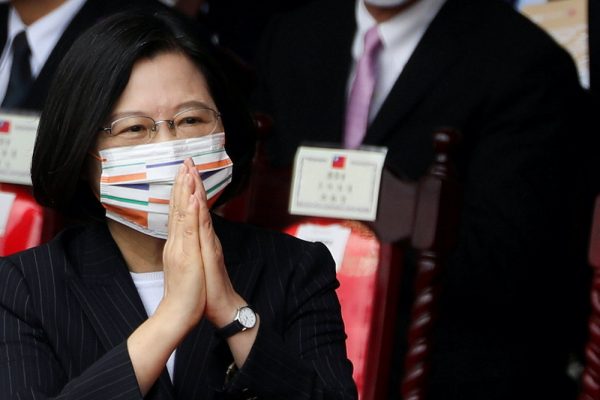In January, Tsai won re-election for Taiwan’s presidency by defeating Han in a landslide. Taiwan then became part of a few jurisdictions globally to virtually eliminate COVID-19 transmission. Tsai was named one of the Financial Times’ twelve most influential women of the year. Thanks to her effective leadership, Taiwan ended the year in a uniquely strong position.
Yet her party, the DPP, did not sweep the 2020 legislative elections in the same way. Although the DPP won a majority of legislative districts — giving it a safe lead within Taiwan’s Legislative Yuan — it tied with the KMT for the party vote with both gaining around 33 per cent of votes. Minor parties earned the remaining third of the party votes. This signalled a shift in Taiwanese domestic politics away from predominant two-party competition.
After the election, Taiwan acted quickly to stem the spread of COVID-19. Taiwan’s success in managing the pandemic is shown in the statistics. As of 23 December, Taiwan had reported 776 cases and only seven deaths. It went for over 250 days between April and December without recording a local infection. Taiwan’s success has not gone unnoticed, with positive media headlines framing the island as a robust democratic success rather than a contentious military flashpoint.
Taiwan’s government has tried to capitalise on the good publicity to further its acceptance internationally. It sent millions of masks abroad, resulting in dozens of countries making formal statements thanking Taiwan for its assistance. Some countries began to see Taiwan in a new light: as a contributing member of the global community.
This year’s intensification of US–Taiwan relations are the result of bipartisan Taiwan policy that passed the US Congress pre-COVID-19 and should not be seen as simply a retaliatory measure taken by US President Donald Trump after both his and China’s mishandling of its pandemic response. The 2019 Taiwan Allies International Protection and Enhancement Initiative (TAIPEI) Act called for more high-level official dialogue, boosted support for Taiwan’s involvement within international organisations and pushed for a US–Taiwan free trade agreement (FTA). It was the impetus for visits by US Health and Human Services Secretary Alex Azar and Undersecretary of State for Economic Growth, Energy, and the Environment Keith J Krach to Taiwan and the opening of new economic dialogues.
Tsai has spent a large amount of her political capital accumulated from her COVID-19 success on potential future trade deals. She has declared that US pork will be allowed into Taiwan despite it containing ractopamine, a chemical that promotes leanness. Domestically, the issue of US pork has become the biggest (and perhaps only) divisive issue that the opposition KMT has available to push back against Tsai. Even some within the DPP do not support Tsai’s decision. The DPP itself opposed US beef sales when the KMT was in power because of ractopamine. But US pork is seen as a starting point for a potential US–Taiwan FTA.
US–Taiwan relations under the incoming Biden administration are also off to an optimistic start. US president-elect Joe Biden’s secretary of state nominee Antony Blinken took a phone call with Taiwan’s chief representative to the United States, Hsiao Bi-khim — a sign that high-level dialogue will continue under the Tsai and Biden administrations.
Yet, cross-Strait relations made no improvement this year despite Tsai’s continued attempts to reach out to Xi for dialogue. Despite the DPP’s best attempts to improve relations, China continues to stonewall Taiwan both within the Taiwan Strait and on the international stage. Taiwan was met with a drastic increase in military drills meant to signal that it would not allow Taiwan to increase its global presence without consequence. China is likely to continue attempts to isolate and marginalise Taiwan by blocking it from entering international organisations or punishing countries or corporations that acknowledge Taiwan as a sovereign state.
Despite Taiwan’s success in handling the pandemic there is room for improvement on a number of other key domestic issues in a post-COVID-19 world. Taiwan’s treatment of Southeast Asian migrant workers, for example, continues to be a glaring mark on its human rights record. Taiwan’s inclusion on the US Labor Department’s 2020 List of Goods Produced by Child Labor or Forced Labor and the disproportionate punishment imposed on Southeast Asian migrants for breaking quarantine reflect poorly on its status as an established democracy.
Taiwan’s political stability and COVID-19 success underscore its newly found positive international image in 2020. China’s tactics to isolate Taiwan have not stopped it becoming one of East Asia’s strongest democracies. While the world waits to see how the Biden administration’s foreign policy team will approach China and Taiwan, President Tsai at least will be in a position to roll into 2021 confident in Taiwan’s firm global standing.
Lev Nachman is a PhD Candidate in the Department of Political Science, University of California, Irvine and a Visiting Scholar in the Sociology Department, National Taiwan University.
This article is part of an EAF special feature series on 2020 in review and the year ahead.


“The DPP itself opposed US beef sales when the KMT was in power because of ractopamine.” The DPP did oppose a full opening for US beef sales a decade ago, but it wasn’t because of ractopamine, mad cow disease instead.